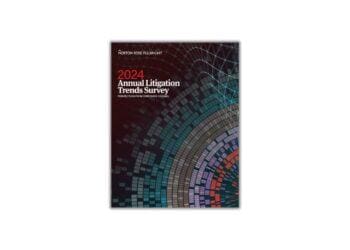Reputation risk expert Michael Toebe explores two recent high-profile cases of ethical oversights that have produced very real consequences in terms of social backlash, eroded public trust and harm to the companies’ internal reputations.
Ethics are not intended to be fluid, yet it’s transparent that for some leaders and organizations that end up in the news, situational ethics are more common than uncommon.
That low-quality commitment to practice ethics is often accompanied by shaky or missing governance and compliance. The results are not without consequences, as whistleblowers do step forward and employees feel more empowered and are increasingly assertive — and the media is an experienced, aggressive watchdog.
Problematic absence of ethics or selective practice of them reflects a compromised mindset and accompanying dangerous attitudes and business practices, elevating risk not only external to the organization, but internal as well.
This is something executives, managers and boards of directors don’t often consider: the internal reputation damage and thus, the negative emotions, lower morale and, these days, higher probability of blowback.
Not-so-surprising outcomes include eroded or forfeited trust capital and reputation capital concerning leadership credibility and thus diminished effectiveness in influencing and persuading the organization.
Two companies who can recently attest to the internal reputation damage that can come from faulty judgment and questionable ethics, governance and compliance: Wayfair and Google.
A Crisis at Wayfair
Shocked and angry at the actions of leadership that were seemingly incongruent with the company’s purported values – ones leaders expected workers to follow – several hundred Wayfair employees staged a walkout.
The actions in question: executives were doing business with a new federal detention center in Texas, selling furniture to be used by migrant children who were being detained – a practice widely seen as immoral, if not a crime against society.
Social responsibility is increasingly considered a standard and an expectation, a matter of ethics, governance and – at least in the minds of the media, special interest groups, employees and the public – compliance as well. Even government officials are raising their voices in support.
Being exposed for governance and compliance shortcomings will often attract negative media attention and a governmental and public anger – especially on social media, where debate fires run hot, gain in intensity and have been shown to negatively impact perception to the point that consequences to organizations and their leaders do occur, requiring (demanding, maybe) corrective, protective action.
According to Deloitte, the professional services consulting firm, “… of the companies reporting damage to reputation, nearly three in five (57 percent) experienced a leap in customer complaints. Complaining customers often express their ire on social media and defect to competitors.”
Five hundred workers wrote to Wayfair, asking the company to stop doing business with BCFS, the government contractor that manages the facility. Reportedly, executives declined to do so – certainly their decision to make – yet with choices come rewards or consequences, and Wayfair’s judgments, decisions and actions led to the walkout and intensified media reporting, which served to shed an unflattering light on the company.
“Organizations should also pay attention to whistleblowers, supplier complaints and cybersecurity reports. They should push leaders to examine unchallenged beliefs to determine with confidence that management has sufficient controls in place to prevent a crisis,” Deloitte advises.
Wayfair reframed the issue as the detained children having a bed to sleep in when the children otherwise would not have a bed. Perspective, maybe, yet media (and especially the public, through social media) saw that mindset as rationalization, a blind spot and enabling mistreatment of children.
There is a saying in conflict resolution that goes “do you want to be ‘right’ or do you want resolution?”
Wayfair believes it is being moral and ethical, yet a significant portion of its employees see it differently – as a black-and-white, clear-cut, right-and-wrong moral crisis that is now costing leadership trust, credibility, and reputation capital. It could prove to be mismanaged risk, which has and will have financial consequences, research shows.
This is why internal reputation quality, from healthy relationship exchanges, is a critical leadership and organizational responsibility; even so, it is often overlooked or undervalued, even if reputation starts internally before it goes external.
Employees expect a reasonable level of “compliance” to morals, ethics, internal relationships and social responsibility. This may not be the way of the past, but noncompliance here is rejecting the reality of the growth of employee empowerment. And fighting against noncompliance will influence perception and opinion – internal and external – and pay dividends in terms of reputation and trust-building.
The story might be out of the news cycle now, but it will be referred to in the future when similar disputes arise, and some of Wayfair’s market will no longer do business with the company. Research shows that a “crisis” like this has a long-term effect on earnings.
Reputation Risk at Google
Google has also struggled with its reputation inside the company. While externally, its reputation is analyzed as strong by reputation firm research, Google’s internal reputation is not nearly as strong and healthy due to poor oversight, low-quality culture for women and inconsistent ethics – issues that have caused a figurative fire inside the organization.
Recently, two former executives accused of sexual harassment were awarded a $135 million settlement. As is increasingly common, the news leaked to the media and what followed was a social media wave of negativity. Some key questions spring to mind:
If executives valued internal reputation, wouldn’t they consider the optics of this situation?
Couldn’t this be reasonably be perceived – by male and female employees both – as a different set of rules for executives and weak oversight, enabling and richly rewarding misbehavior, a lack of self-government, low character and disappointing ethics?
Even if the money had to legally be paid, the questions above remain.
Think of the negativity.
Isn’t it to be expected?
Is it unreasonable for workers to feel unheard, disrespected, mistreated and resentful that executives face no significant consequences?
Could this cost Google skilled, productive, valuable employees?
Could it open up the company to a lawsuit – or many?
Could it negatively impact Google with prospective employees (especially women)?
Does the company recognize the mismanagement of reputation risk?
A lawsuit brought by an Alphabet shareholder shined a light on what’s likely to be the belief internally. Considering the language, it’s a wonder Google didn’t perceive it in a similar manner.
“If you were a high-level male executive at Google responsible for generating millions of dollars in revenue, Google would let you engage in sexual harassment,” the lawsuit read, according to a CBS News report. “And if you get caught, Google would keep it quiet, let you resign and pay you millions of dollars in severance.”
“On the other hand, if you were a low-level employee at Google and were accused of sexual harassment or discrimination, you would be fired for cause with no severance benefits. In this way, Alphabet was able to maintain optics and superficial compliance with its code of conduct, internal rules and laws regarding sexual harassment. By appearing to take decisive action against a significant number (48 by one media report) of low-level employees, and by concealing the blatant and widespread sexual harassment by senior Google executives, the board avoided a much bigger scandal,” the lawsuit read.
Sometimes perception is reality, based in fact and evidence. Internal reputation is an undervalued mindset; an oversight in this regard can prove to be expensive relationship negligence.
It’s critical to ensure core values are put into practice; the healthy relationships that come about internally will build trust and improve reputation capital so that conflict results less often in negative outcomes.
Oversight is a wise strategy to implement – as is encouraging early detection, reporting and civil, thorough problem-solving.



 Michael Toebe is a reputation specialist who serves individuals and organizations. He regularly writes on communication, ethics, governance, conflicts, scandal, reputation and crisis. He is the writer of “Red Diamonds Essays” and “Reputation Specialist Essays,” both on the Medium platform.
Michael Toebe is a reputation specialist who serves individuals and organizations. He regularly writes on communication, ethics, governance, conflicts, scandal, reputation and crisis. He is the writer of “Red Diamonds Essays” and “Reputation Specialist Essays,” both on the Medium platform.







